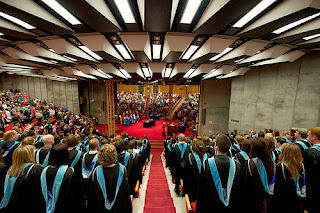Nova Scotia's Education Advantage
Recently I sat at dinner beside a
gentleman who told me he had attended the Mount’s Convocation for the first
time this May. When I asked him why, he told me that he and his wife have
a housekeeper who for many years has been working part-time in the evenings to
complete her degree. She’s the first in her family to attend university,
and they were there to celebrate her success. This story offered a powerful
reminder of the dedication and hard work that goes into earning a university
degree, and the pride our graduates – and their supporters – take in their
accomplishments.
Nova Scotia is home to ten
excellent universities, each boasting thousands of similar success stories every year. As the Mount graduates talented students in fields such as communications,
modern languages, applied nutrition, family studies, public policy, economics and
more, so too do our counterparts in their areas of focus. These efforts arm our
province with a highly educated, highly skilled, competitive workforce and each
graduate is a testament to the role we play in elevating our region as a whole.
But our contributions extend far beyond annual convocations.
 |
| Our new international students visit Peggy's Cove |
As a major port city in Eastern Canada, Halifax
is at a crossroads. The Nova Scotia government, in partnership with the
federal government, appreciates the value of internationalization and has made
it a priority to increase immigration in the province, particularly
Canadian-trained international graduates. Our universities have a key role to
play in this process.
Organizations such as EduNova are
working hard to grow the number of international students in Nova Scotia’s
universities, colleges, and schools. In 2012-13, over 6,000 international
students (13.8 % of the total student body) chose to study in Nova Scotia’s
universities. These students generate over $230 million for Nova Scotia’s
economy, and hundreds of jobs right across the province. Many of these students
choose to stay in Nova Scotia after graduation, bringing valuable international
skills and experiences, global networks, and new perspectives to our
communities.
 |
| Meng Zhao, BPR '10 |
Currently, the Mount’s student body of just over 4,000 includes 590 international
students from over 50 countries. Apart
from the strong economic case for international education, these students
greatly enrich our campus, many becoming leaders in both academics and
community service. PR graduate and Dakai
Magazine founder Meng
Zhao sets a strong example as she builds ties between the local community
and Chinese culture. It’s clear that the ongoing accomplishments of our
international students will only continue to enhance our region.


